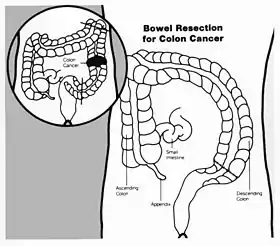Bowel resection
A bowel resection or enterectomy (enter- + -ectomy) is a surgical procedure in which a part of an intestine (bowel) is removed, from either the small intestine or large intestine. Often the word enterectomy is reserved for the sense of small bowel resection, in distinction from colectomy, which covers the sense of large bowel resection. Bowel resection may be performed to treat gastrointestinal cancer, bowel necrosis, severe enteritis, diverticular disease, Crohn's disease, endometriosis, ulcerative colitis, or bowel obstruction due to scar tissue. Other reasons to perform bowel resection include traumatic injuries and to remove polyps when polypectomy is insufficient, either to prevent polyps from ever becoming cancerous or because they are causing or threatening bowel obstruction, such as in familial adenomatous polyposis, Peutz–Jeghers syndrome, or other polyposis syndromes.[1] Some patients require ileostomy or colostomy after this procedure as alternative means of excretion.[1] Depending on which part and how much of the intestines are removed, there may be digestive and metabolic challenges afterward, such as short bowel syndrome.
| Bowel resection | |
|---|---|
 Drawing showing bowel resection for colon cancer | |
| Specialty | Gastroenterology |
Types
Types of enterectomy are named according to the relevant bowel segment, as follows:
| Procedure | Bowel segment | Notes |
|---|---|---|
| duodenectomy | duodenum | |
| jejunectomy | jejunum | |
| ileectomy | ileum | |
| colectomy | colon | |
See also
References
- "Small bowel resection". MedlinePlus: U.S. National Library of Medicine. Retrieved 1 June 2013.